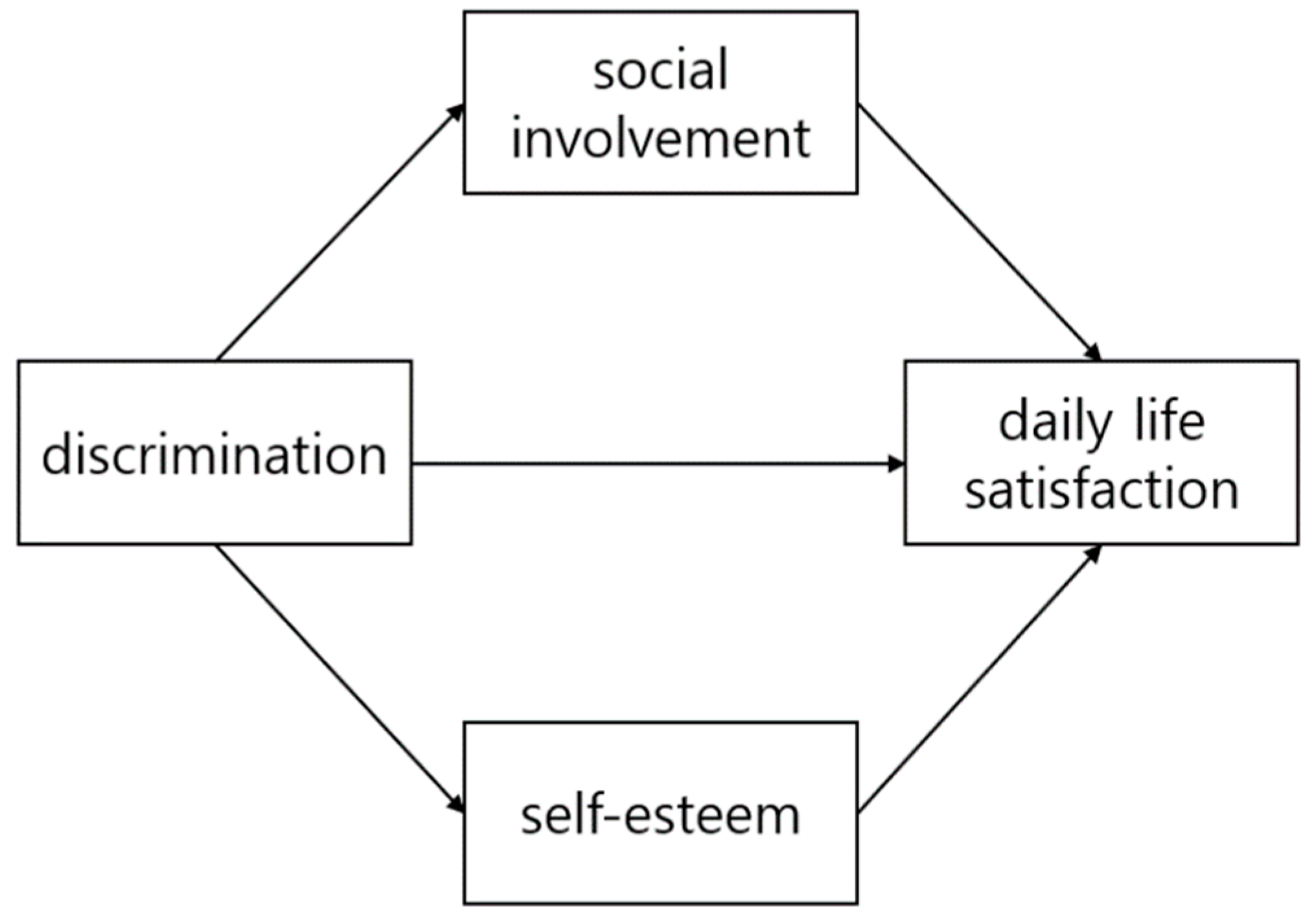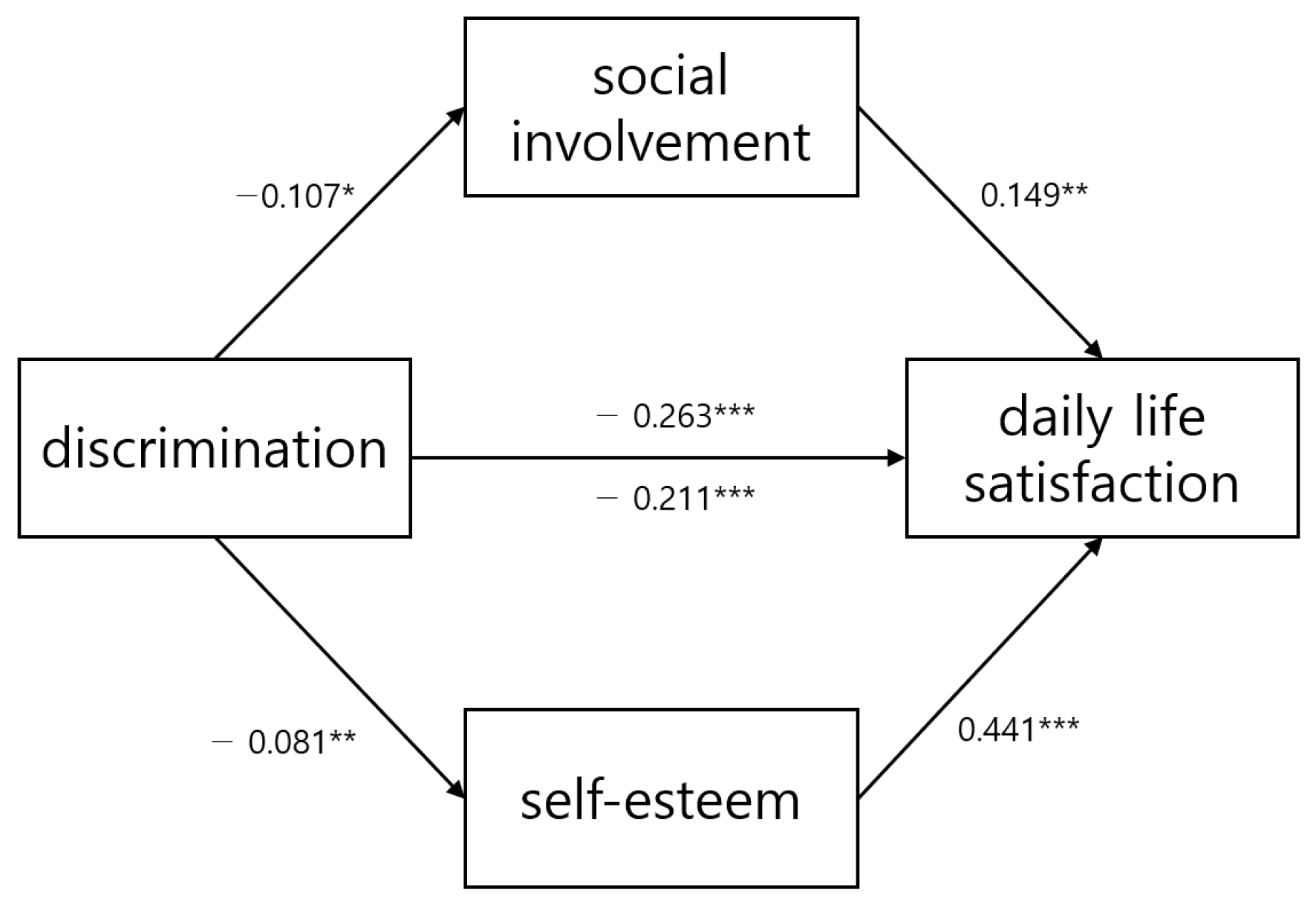The Effect of Discrimination on the Daily Life Satisfaction of People with Developmental Disability: Parallel Multiple Mediating Effect of Social Involvement and Self-Esteem
Abstract
1. Introduction
2. Materials and Methods
2.1. Participants
2.2. Design
2.3. Variables
2.4. Data Analysis
3. Results
3.1. Correlation
3.2. Mediating Effect
3.2.1. Direct Effect among Variables
3.2.2. Parallel Mediating Effect
3.2.3. Indirect Effects of Mediating Variables
4. Discussion
5. Conclusions
Author Contributions
Funding
Institutional Review Board Statement
Informed Consent Statement
Data Availability Statement
Conflicts of Interest
References
- Ministry of Health and Welfare. 2020 Survey on the Status of People with Disabilities; Ministry of Health and Welfare: Sejong, Republic of Korea, 2021.
- Lee, S.H.; Jung, H.E. The Effect of Developmental Disabilities on Disabled Persons’ Life Satisfaction: Parallel Mediation of Dependence on Others, Discrimination, and Leisure/Social Activities. J. Emot. Behav. Disord. 2020, 36, 209–229. [Google Scholar] [CrossRef]
- Lee, Y.M.; Yoo, C.M. The Moderating Effects of Social Participation in the Relationship between Discrimination Experience and Daily Life Satisfaction of Person with Developmental Disabilities. J. Disabil. Welf. 2021, 51, 117–138. [Google Scholar]
- Kim, S.R.; Song, J.Y. The Influence of Daily Life’s Disability Discrimination on Life Satisfaction of Wage Earners with Disabilities -Focused on the Mediating Effect of Depression and Job Satisfaction. J. Rehabil. Res. 2016, 20, 73–94. [Google Scholar]
- Choi, B.I. Women with disabilities experience discrimination impact on life satisfaction: Focusing on the mediating effect of self-esteem. Korean Acad. Pract. Hum. Welf. 2015, 14, 139–158. [Google Scholar]
- Park, J.K.; Kim, J.J. A Study on the Subjective Quality of Life of People with Disabilities. J. Rehabil. Res. 2009, 13, 163–186. [Google Scholar]
- Lee, J.S. The subjective well-being of people with disabilities: A gender comparison to structural equation model of life satisfaction. Korean J. Soc. Welf. 2007, 59, 89–114. [Google Scholar]
- Oh, M.L.; Kim, K.S. A study on the variables affecting the life satisfaction of women with disabilities. Korean J. Fam. Soc. Work 2015, 50, 155–179. [Google Scholar]
- Han, C.K.; Kim, J.Y. Asset effects on the life satisfaction of workers with disabilities in Korea: The mediating effects of self-esteem and job satisfaction. J. Soc. Serv. Res. 2021, 48, 98–107. [Google Scholar]
- Ju, Y.H.; Chung, I.J. The Impact of Discrimination Experience of Persons with Developmental Disability on Self-Esteem: Focusing on the Mediating Effect of Life Satisfaction and the Moderating Effect of Earned Income. Soc. Sci. Res. 2016, 32, 55–78. [Google Scholar] [CrossRef]
- Yun, H.J.; Shin, J.E. Determinants of Life Satisfaction of People with Disabilities in Korea: The Role of Public Transfer Income. Health Soc. Welf. Rev. 2015, 35, 432–461. [Google Scholar]
- Cho, H.C.; Yoon, M.S. The Effect of Discrimination Experience mediated with Self-esteem on the Life Satisfaction of the Severely Disabled People: Group Comparison of Employment and Disability Type. J. Disabil. Welf. 2016, 33, 67–90. [Google Scholar]
- Oh, S.K. The Effects of Discrimination Experience in Daily living on Participation in Social Activities of People with Visual Impairment. Glob. Soc. Welf. Rev. 2021, 11, 23–37. [Google Scholar] [CrossRef]
- Narimani, M.; Mousazadeh, T. Comparing self-esteem and Self-concept of handicapped and normal students. Procedia Soc. Behav. Sci. 2010, 2, 1554–1557. [Google Scholar] [CrossRef][Green Version]
- Nosek, M.A.; Hughes, R.B.; Swedlund, N.; Taylor, H.B.; Swank, P. Self-esteem and women with disabilities. Soc. Sci. Med. 2003, 56, 1737–1747. [Google Scholar] [CrossRef]
- Park, H.O.; Lee, A.Y. The Effect of Taekwon Gymnastics Program on Participation Attitude and Self-Esteem of Children with Intellectual Disabilities. J. Korean Assoc. Dev. Disabil. 2012, 16, 279–295. [Google Scholar]
- Lee, S.B.; Hwang, H.H.; Lee, J.M. Study about the Effect of a Swimming Activity Integrated on Self-Concept and Sociality with Intellectual Disability Children. Korean Soc. Sports Sci. 2012, 21, 193–204. [Google Scholar]
- Jeon, Y.J.; Kim, W.K. The Effects of the Spinning Exercise Program on the Stress and Self-Esteem of the Juveniles with Intellectual Disabilities. Sport Sci. 2017, 34, 181–193. [Google Scholar]
- Seo, J.H.; Shin, J.S. The Effects of Leisure Activity Programs on the Ego-identity and Self-esteem of High School Students with Intellectual Disabilities. J. Spec. Educ. Theory Pract. 2010, 11, 69–91. [Google Scholar]
- Park, H.W.; Huh, M.R.; Oh, W.; Kim, C.K.; Lim, K.B.; Kim, H.Y.; Son, B.G.; So, I.S. Effect of Horticultural Therapy on Self-esteem and Working Attitude of Institutionalized Intellectual Disabilities. J. People Plants Environ. 2011, 14, 265–269. [Google Scholar]
- Baek, S.Y. Impact of Music Therapy with Orff Approach on the Attention and Self-esteem of Intellectual Disabilities. J. Humanit. Soc. Sci. 2016, 7, 23–38. [Google Scholar]
- Gecas, V. The self-concept. Annu. Rev. Sociol. 1982, 8, 1–33. [Google Scholar] [CrossRef]
- Baumeister, R.F.; Campbell, J.D.; Krueger, J.I.; Vohs, K.D. Does high self-esteem cause better performance, interpersonal success, happiness, or healthier lifestyles? Psychol. Sci. Public Interest 2003, 4, 1–44. [Google Scholar] [CrossRef] [PubMed]
- Sanders, K.Y. Overprotection and lowered expectations of persons with disabilities: The unforseen consequences. Work 2006, 27, 181–188. [Google Scholar]
- Kim, M.O.; Jung, E.H.; Park, J.H. Effect of Communication Level and Social Participation on Happiness of the People with Developmental Disabilities—Focused on the Mediating Effect of the Autoregressive Cross-lagged Modeling. Soc. Welf. Policy 2020, 47, 5–29. [Google Scholar]
- Kim, J.W. A Study on the Issues of Participation of People with Intellectual Disabilities in Research Process in Korea. Korean J. Soc. Welf. 2008, 60, 83–105. [Google Scholar]
- Ministry of Health and Welfare. 2022 Survey on the Work and Life of Persons with Developmental Disabilities; Ministry of Health and Welfare: Sejong, Republic of Korea, 2023.


| Item | Category | n (%) | Item | Category | n (%) |
|---|---|---|---|---|---|
| Disability | ID | 355 (92.7) | Academic ability | Uneducated | 33 (8.6) |
| ASD | 28 (7.3) | Elementary | 34 (8.9) | ||
| Male | 249 (65) | Middle School | 51 (13.3) | ||
| Sex | Female | 134 (35) | High School | 240 (62.7) | |
| Single | 330 (86.2) | University | 25 (65) | ||
| Marriage status | Married/Cohabit | 36 (9.4) | Age | 15~29 | 159 (41.5) |
| Divorced/ | 17 (4.4) | 30~39 | 97 (25.3) | ||
| Bereaved | 40~49 | 77 (20.1) | |||
| Multiple disabilities | Yes | 36 (9.4) | 50 and above | 50 (13.1) | |
| No | 347 (90.6) |
| Discrimination | Social Involvement | Self-Esteem | Satisfaction with Daily Life | |
|---|---|---|---|---|
| Discrimination | - | |||
| Social involvement | −0.12 * | - | ||
| Self-esteem | −0.17 ** | 0.30 ** | - | |
| Satisfaction with daily life | −0.36 ** | 0.28 ** | 0.34 ** | - |
| Direct Effect | B | SE | t | |
|---|---|---|---|---|
| (independent) | (dependent) | |||
| Discrimination → Daily life satisfaction | −0.211 | 0.041 | −5.126 *** | |
| (independent) | (dependent) | |||
| Discrimination → Social involvement | −0.107 | 0.050 | −2.123 * | |
| Discrimination → Self-esteem | −0.081 | 0.026 | −3.133 ** | |
| (Mediator) | (dependent) | |||
| Social involvement → Daily life satisfaction | 0.149 | 0.045 | 3.268 ** | |
| Self-esteem → Daily life satisfaction | 0.441 | 0.089 | 4.970 *** | |
| B | SE | t | LLCI | ULCI | |
|---|---|---|---|---|---|
| Total effect | −0.26 | 0.043 | −6.08 *** | −0.35 | −0.18 |
| Direct effect | −0.21 | 0.041 | −5.13 *** | −0.29 | −0.13 |
| Model summary R = 0.313, R2 = 0.098, F = 36.992 *** | |||||
| Category | B | Boot SE | 95% CI | |
|---|---|---|---|---|
| Boot LLCI | Boot ULCI | |||
| Discrimination → Social involvement → Daily life satisfaction | −0.02 | 0.011 | −0.042 | −0.001 |
| Discrimination → self-esteem → Daily life satisfaction | −0.04 | 0.014 | −0.072 | −0.018 |
| Total indirect effect | −0.06 | 0.018 | −0.098 | −0.029 |
Disclaimer/Publisher’s Note: The statements, opinions and data contained in all publications are solely those of the individual author(s) and contributor(s) and not of MDPI and/or the editor(s). MDPI and/or the editor(s) disclaim responsibility for any injury to people or property resulting from any ideas, methods, instructions or products referred to in the content. |
© 2023 by the authors. Licensee MDPI, Basel, Switzerland. This article is an open access article distributed under the terms and conditions of the Creative Commons Attribution (CC BY) license (https://creativecommons.org/licenses/by/4.0/).
Share and Cite
Choi, J.; Shin, B.; Choi, B.-S. The Effect of Discrimination on the Daily Life Satisfaction of People with Developmental Disability: Parallel Multiple Mediating Effect of Social Involvement and Self-Esteem. Medicina 2023, 59, 1988. https://doi.org/10.3390/medicina59111988
Choi J, Shin B, Choi B-S. The Effect of Discrimination on the Daily Life Satisfaction of People with Developmental Disability: Parallel Multiple Mediating Effect of Social Involvement and Self-Esteem. Medicina. 2023; 59(11):1988. https://doi.org/10.3390/medicina59111988
Chicago/Turabian StyleChoi, Jinhyeok, Byeolhae Shin, and Bum-Sung Choi. 2023. "The Effect of Discrimination on the Daily Life Satisfaction of People with Developmental Disability: Parallel Multiple Mediating Effect of Social Involvement and Self-Esteem" Medicina 59, no. 11: 1988. https://doi.org/10.3390/medicina59111988
APA StyleChoi, J., Shin, B., & Choi, B.-S. (2023). The Effect of Discrimination on the Daily Life Satisfaction of People with Developmental Disability: Parallel Multiple Mediating Effect of Social Involvement and Self-Esteem. Medicina, 59(11), 1988. https://doi.org/10.3390/medicina59111988






